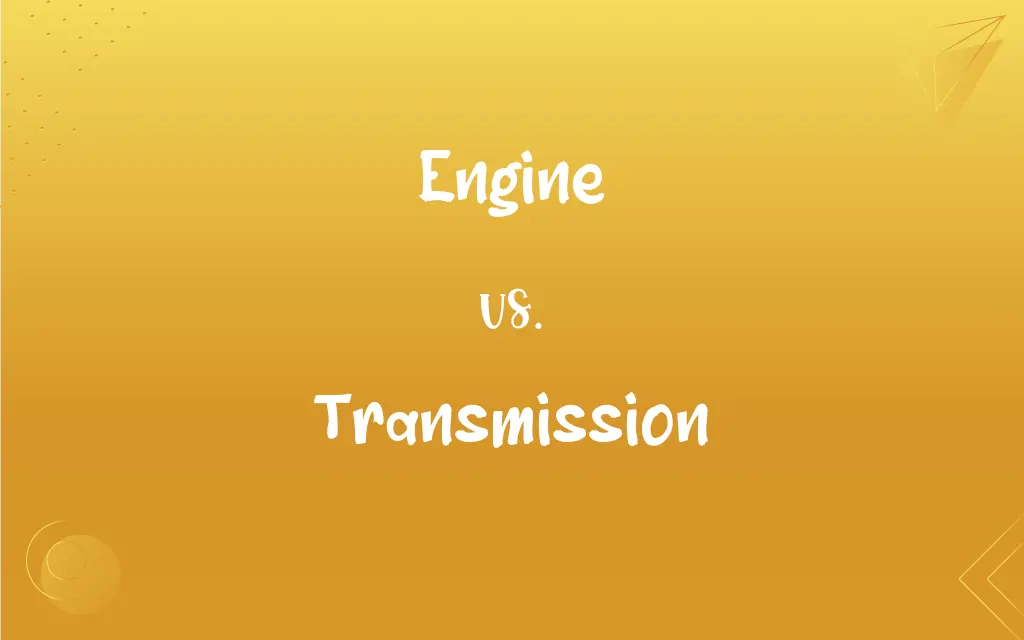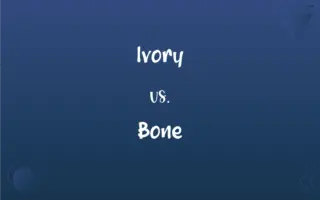Engine vs. Transmission: What's the Difference?
Edited by Janet White || By Harlon Moss || Updated on October 9, 2023
The engine generates power, while the transmission adjusts and transfers this power to the wheels, enabling vehicle movement.

Key Differences
An engine is a machine designed to convert fuel into mechanical energy, essentially generating the power needed to move a vehicle. It is the heart of the vehicle, burning fuel (such as gasoline, diesel, or electricity) to produce power, and its capacity is often measured in terms of cubic centimeters (cc) or liters to indicate size. Engines can be found in various configurations, such as inline, V-type, or boxer, each having distinct characteristics affecting vehicle performance and balance.
Conversely, the transmission is an intricate system that manages the power generated by the engine, ensuring that it is transmitted to the wheels in the most efficient way possible. It achieves this through varying gear ratios, automatically or manually, adapting to the driving conditions and driver inputs. The transmission modulates the engine’s power, managing speed and torque through various gears to optimize performance and fuel efficiency.
The engine and transmission must work in harmony to ensure smooth vehicle operation. An engine produces a range of power in various scenarios, such as accelerating, cruising, or idling, and this power is constant, necessitating a system to regulate it according to the vehicle's needs. The engine is pivotal for initiating and maintaining the vehicle's movement, using its mechanisms to transform fuel into usable energy.
The transmission steps in to manage and adapt this power efficiently, ensuring the vehicle moves at the desired speed while also maintaining the engine within optimal operating parameters. While the engine is paramount for creating the energy to propel the vehicle, the transmission is crucial in managing and utilizing this energy proficiently, aligning the engine's output with the vehicle's speed and road conditions.
Comparison Chart
Primary Function
Generates power through fuel conversion.
Transfers and adjusts engine power to the wheels.
ADVERTISEMENT
Measurement
Measured in liters or cubic centimeters.
Often categorized by the number of available gears.
Components
Includes cylinders, pistons, and camshaft.
Consists of gears, clutches, and shafts.
Maintenance
Involves oil changes, tuning, etc.
May require fluid checks and changes.
Replacement Cost
Typically higher due to complexity.
Can be costly, especially in automatic types.
Engine and Transmission Definitions
Engine
An engine converts fuel into mechanical energy.
The engine roared to life when she turned the key.
ADVERTISEMENT
Transmission
Transmissions can be manual or automatic.
He prefers driving a manual transmission for greater control over the gears.
Engine
Engines can have various configurations and cylinder counts.
His motorcycle has a parallel-twin engine, known for its compactness and efficiency.
Transmission
Transmission functionality relies on various gears and clutches.
The transmission seamlessly switches gears to adapt to different driving conditions.
Engine
An engine requires regular maintenance for optimal function.
She takes her car for an engine check-up and oil change every few months.
Transmission
A transmission modulates the power generated by the engine.
The transmission ensures the car moves smoothly across different speeds.
Engine
Engines can utilize various fuels, like gasoline or electricity.
This model uses a hybrid engine, combining gasoline and electric power.
Transmission
Transmission fluid aids in the smooth operation of the system.
Regularly checking and changing the transmission fluid ensures longevity and smooth operation.
Engine
Engine capacity is often expressed in liters.
The sports car features a powerful 4.0-liter engine.
Transmission
The transmission connects to the vehicle's wheels via axles.
Without a functioning transmission, the engine's power cannot reach the wheels.
FAQs
What is the primary function of an engine?
The engine generates power by converting fuel into mechanical energy.
Can engines run on different types of fuel?
Yes, engines can utilize various fuels, such as gasoline, diesel, and electricity.
What is the difference between automatic and manual transmissions?
Automatic transmissions change gears without driver input, while manual transmissions require the driver to manually select gears.
What maintenance does an engine commonly need?
Common engine maintenance includes oil changes, air filter replacements, and spark plug checks.
Can engine problems affect fuel efficiency?
Yes, issues with the engine can lead to decreased fuel efficiency and performance.
What does a transmission do in a vehicle?
The transmission adjusts and transfers the engine’s power to the wheels.
Can a transmission be manually shifted in all cars?
Not all cars, but some automatic transmissions allow manual-style gear shifting.
How does engine power impact vehicle performance?
Greater engine power can provide faster acceleration and higher top speeds.
How often should transmission fluid be changed?
Generally, transmission fluid should be changed every 30,000 to 60,000 miles, depending on the vehicle.
Can a faulty transmission damage the engine?
A faulty transmission can cause the engine to work harder, potentially causing damage over time.
What is a turbocharger in an engine?
A turbocharger boosts engine power by forcing extra air into the combustion chamber.
Can a vehicle move without a functioning transmission?
Without a functioning transmission, a vehicle cannot properly transfer power from the engine to the wheels, hindering movement.
How is engine size typically measured?
Engine size is usually measured in cubic centimeters (cc) or liters.
What does a transmission's gear ratio affect?
The gear ratio affects vehicle speed, engine workload, and fuel efficiency.
Why is transmission fluid important?
Transmission fluid lubricates, cools, and cleans the transmission, ensuring smooth operation.
Is it possible to drive with a malfunctioning engine?
A malfunctioning engine can hinder safe and efficient driving and may cause further damage.
Can you replace a transmission yourself?
Replacing a transmission can be complex and is typically best handled by professionals.
What causes engine overheating?
Engine overheating can be caused by coolant issues, radiator problems, or a malfunctioning thermostat.
Can engines be swapped between different vehicle models?
Engine swaps are possible but require consideration of space, compatibility, and legal regulations.
What happens when a transmission fails while driving?
Transmission failure can result in the loss of power transfer to the wheels, impacting vehicle control.
About Author
Written by
Harlon MossHarlon is a seasoned quality moderator and accomplished content writer for Difference Wiki. An alumnus of the prestigious University of California, he earned his degree in Computer Science. Leveraging his academic background, Harlon brings a meticulous and informed perspective to his work, ensuring content accuracy and excellence.
Edited by
Janet WhiteJanet White has been an esteemed writer and blogger for Difference Wiki. Holding a Master's degree in Science and Medical Journalism from the prestigious Boston University, she has consistently demonstrated her expertise and passion for her field. When she's not immersed in her work, Janet relishes her time exercising, delving into a good book, and cherishing moments with friends and family.































































